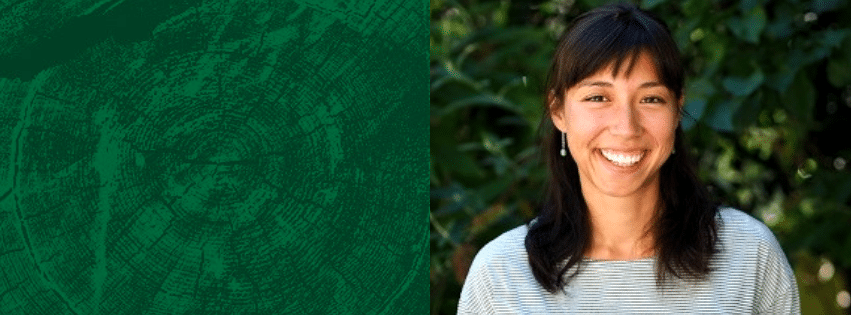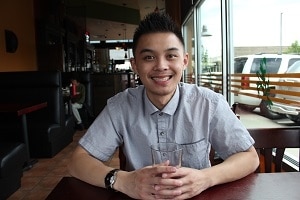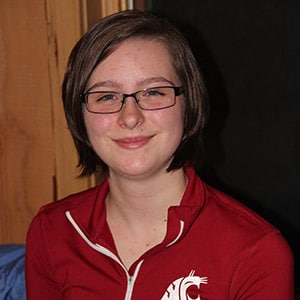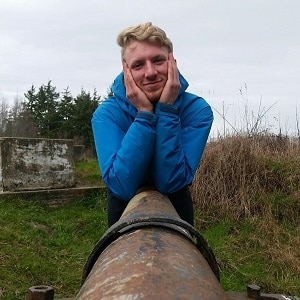“Engineering is all imagination,” says Andy Tran. “I had a lot of it as a…
Author: Tamar Kupiec
If you look at the leaves of the salmonberry, a plant that thrives in the forests of IslandWood, you’ll notice the serrated edge of the leaves. And if you get real close, you might also see fine prickles on the stems. Ask Keiko Budech if you want to know something about its flowers and fruit and its preference for moist forest clearings.
She first encountered this species fifteen years ago when she took part in the School Overnight Program (SOP) with Bryant Elementary. As part of an investigation in botany, IslandWood teachers assigned students their own plants to study and present to the group. Each time Keiko spotted her plant in the wild, her confidence surged. She was an expert, and it felt wonderful.
Today Keiko is an expert in environmental policy. She has a degree in the field from Pitzer College. After graduating, she worked as a senior communications associate at Sightline Institute. Sightline researches and advocates policy that improves the health of the environment and empowers citizens to participate in government. It fights against dirty energy projects and for the carbon tax; it envisions clean, safe cities with affordable housing, walkable neighborhoods, and green jobs. Keiko worked with the media to get this research into the hands of policymakers and community activists. She presented complex information in a way people can understand, just as she presented as a fifth-grader at IslandWood. From the anatomy of the salmonberry to the policy of public transit…
Her IslandWood experience was filled with many firsts. Keiko was a city girl and had not spent too much time outdoors. She had never been to camp and was nervous about sleeping away from home. What would a school in the woods look like? she worried. She pictured cold, dark, and crowded bunks but instead found the airy, light-filled lodges of the IslandWood campus, with four children to a room. Her fears of the dark and of heights were calmed in the community of staff and friends she had come to trust over the four days. The woodland trails with their tree canopy overhead entranced her, and the nighttime walks thrilled her. She stood on the suspension bridge, where her teachers instructed her to look down into the deep ravine and up at the tops of the trees so she could appreciate the scale and layers of the forest. She was not afraid.
Keiko remembers thinking, “This is the first time I’ve really experienced being outside even though I’ve been outside before.” It wasn’t that Keiko didn’t appreciate the natural beauty of the Pacific Northwest. It’s just that she hadn’t been observing her surroundings in the way her IslandWood teachers now asked her to. “When I think back to IslandWood, I think about slowing things down and observing more,” she says. She noted the features of plants and examined invertebrates under a microscope, patiently recording her predictions and observations in a journal. At IslandWood, close observation is both a pathway to scientific rigor and a state of mind in which to experience the natural world. Students are asked not only to see, hear, and smell, but also to wonder and make connections.
“As a fifth grader, [IslandWood] was a really good jumping off point to understand the relationship I have and people have to the environment, to the natural world.” For the first time she appreciated how her life intersected with the environment. That journal? Keiko and her classmates made them. They formed the sheets from a pulp of recycled paper and created the binding with a stick. From then on, she would make the connection between paper and trees. And where did the food waste that the students collected and weighed at the end of each meal go? At IslandWood food waste does not travel to a landfill, but becomes compost for its gardens.
Years later Keiko would start a compost program at her high school as a member of Earth Service Corps, an environmental education and leadership program run by the YMCA. Here she learned about the process of making change: she talked to the principal and staff; contracted with a compost facility; and got her fellow students on board through education and her own passion.
Our impact on the environment still concerns Keiko. How can it be reduced and how can people be taught to understand and control it? This year, Keiko accepted a position as communications manager for Transportation Choices Coalition. She is passionate about “bringing underrepresented voices to the forefront of urban discussions and advancing equity to ensure affordable and accessible transit options for all.” Her expertise just keeps growing.










